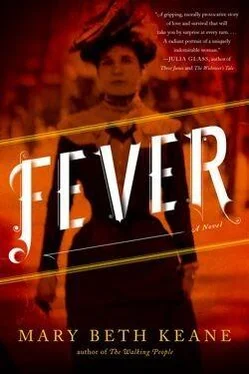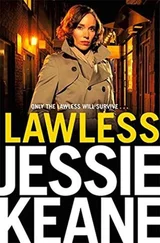“How much farther?” Mary asked.
“Just two doors down.”
Mary dropped her bag to the sidewalk and tried to get a feel for what waited for her, but two doors down looked the same as every door they’d passed for the last several blocks: dark and plain. Rusted staircases stuck to the faces of every building, and from their railings hung a variety of sheets and blankets. Where home had been full of greens and blues in summer, oranges and reds in winter, New York was the same color wherever she looked: the muddy avenues, the muck-splattered carriages, the gray shingles, the faded red brick, the coal smoke that hung in the air and blurred the outlines of everything. The buildings were tall — five, six stories. When Paddy came out of the shop with a loaf of bread, she pointed at the bedding hanging above their heads and asked him why. “Too heavy for the lines,” he said.
“I see,” she said, though she didn’t see. She looked forward to Aunt Kate, and tried to comprehend that somewhere inside one of these buildings that showed their shame to the world lived her nana’s sister. She searched herself for the tug of home.
“How was the journey, anyhow?” Paddy asked then, looking at her for the first time since meeting her.
The girl in the berth below Mary’s had died when they were ten days at sea. In twenty-one days, Mary watched seven bodies slide into the sea, all wrapped in sailcloth and sewn tight. The girl was dropped on the same day as another person, a man by the size of him, and when she fell through the air between the deck and the water, her body bent at the hips, Mary wondered if they’d double-checked, if they were absolutely beyond-a-doubt sure. Someone in the crowd remarked that it was only the Grace of God that would keep the rest of them out of the water, and someone else said Amen, and Mary wondered why God would grant any of them that Grace and not those who’d already been thrown away. It wasn’t the first time Mary noticed that God had a haphazard approach to things.
“Was it very rough?” Paddy asked.
“No, it was grand,” Mary said and looked back at the garbage lining the street, the haggard people rushing about on the sidewalks.
Mary’s aunt had more welcome for her, and scolded her husband thoroughly for not carrying Mary’s bag. She’d prepared a rich lamb stew with carrots and potatoes that went cold before them because every time Mary went to put a spoonful in her mouth, Aunt Kate asked another question about a person from home. Paddy and Aunt Kate had no children and were too old to remedy that fact.
“Well, now,” Aunt Kate said when Mary had finished giving her the news and they’d taken five minutes to eat what was on their plates. “First thing is to find you good work. Then we’ll see. What can you do?”
“I can cook,” Mary told her.
“Cook what? Spuds? A bit of ham? What else can you do?”
“I want to cook.”
“Mary, love, they have stoves in America you’ve never seen the likes of.”
“I can practice on yours.”
“This!” Aunt Kate laughed. “This is nothing. This is a stone’s throw from the turf and the open fire. There are kitchens in some of these houses that have stoves wider than—” Aunt Kate stretched her arms as wide as she could to either side. “They have stoves with four burners, two ovens.”
“I can learn, can’t I?”
“That’s true, I suppose.” Kate regarded Mary with a smile. “Patience, love. It’s very good to see you.”
• • •
After giving Mary a few weeks to settle in, to get accustomed to the pace of the streets and the chaos of the pedestrians, the horses, the freight train that plowed along Eleventh Avenue and didn’t stop for anything; after showing her the spider’s web of clotheslines hidden behind the tenements, and the tub for washing; after letting Mary get used to her cot next to the kitchen table and showing her how to put coal in the stove, and empty the ashes; after taking Mary to meet yet another neighbor who wanted to know her business; and after learning that no one understood her when she spoke except for other Irish and teaching her how to enunciate, speak slowly, try to talk more like an American, Kate finally announced it was time to go to the agency and see what kind of job Mary could get for herself. Mary had just turned fifteen. Kate told her everything she should say, and made her practice at the table after Paddy had gone to bed. She had Mary sit across from her with her hands folded, and then she asked questions about the jobs she’d had in New Jersey and Connecticut. Mary was to describe how she was an accomplished cook and had cooked for families in Ireland before leaving. “You are twenty years old. Same birthday, just subtract five years from the year.”
“But what if they ask where? What if they ask me to describe New Jersey or Connecticut?”
“They won’t. But if they do, you go ahead and describe whatever you imagine. Be confident. They’ve probably never been there themselves.”
Mary tried to speak slowly and sound older than she was, but the woman at the agency just told her in a blank tone that they’d place her as a laundress. “Are you a worker?” the woman had asked. “A real worker?”
“I’m a worker,” Mary assured her.
“Report with clean clothes. Spotless. And keep your person clean at all times. Be respectful to the family and their guests, and for God’s sake don’t try to engage them if they don’t engage you. If one of the family enters a room that you are in, simply exit as quickly as possible. You have no opinion of politics whatsoever and in fact do not follow politics of any kind. You don’t read the newspapers. Do you understand, Miss Mallon?”
“Yes.”
The agent handed her a folded pamphlet that repeated everything she’d just said.
“Are you religious, by the way? Catholic, I imagine.”
“Catholic.”
“The family has probably already assumed you’re Catholic, or will when they meet you, but don’t mention it yourself.”
Mary didn’t know what it meant to be a laundress and hoped she could prove herself and one day be allowed to cook, but she discovered in that first situation that cook and laundress are two different tracks, and a laundress never becomes a cook any more than a cook becomes a Lady. At home, they’d washed their clothes in the river and draped them on rocks to dry. Aunt Kate washed her clothes in a basin, twisted them roughly when she pulled them out, and hung them on the clothesline that stretched across the tops of the outdoor privies to the back wall of another tenement. The night before Mary began, Aunt Kate showed her the little square ounce of Reckitt’s Blue she kept in the pantry, and explained to her about using it for the final rinse to take out any hint of yellow. Fine clothes needed more careful treatment and she warned Mary that if she encountered anything with a lace collar or cloth-covered buttons, to go over them with the sponge instead of sinking them in the tub with the rest.
The family was called Cameron, and Mary slept on a bunk in a room off the kitchen. She took her meals with the other staff. Room and board would be deducted from her wage. The woman at the agency had gone over the deductions so quickly that Mary didn’t have time to calculate until she got back to Aunt Kate’s, and together they realized there would be hardly anything left over. “But it’s good experience,” Aunt Kate said. “There’s value in that as well.” Paddy Brown made a low sound and shifted in front of the stove.
As the woman at the office predicted, the footman, Nathaniel, who’d been charged with greeting Mary and giving her a tour of the home, told her that she would be required to join in the evening prayers nightly. The mistress did not take her faith lightly and required her staff to approach Our Lord with the same seriousness.
Читать дальше












